From Independence to Reconstruction

With approximately thirteen million people, an area almost twice the size of Texas, Angola has been blessed by an abundance of natural resources: oil platform in the sea, fishing on the coasts, fertile land and mineral reserves.
The peace has become a reality in Angola since 2002, when it ended the civil war that lasted twenty-seven years, which began with the independence of the former Portuguese colony in 1975. With a stable republic for five years, the nation undertook a journey complicated and extensive to enable today, in terms of major economic and geopolitical analysts of the world, this country is emerging as quoted to take the lead, in the long term, of Central and Southern part of Africa, including the Gulf of Guinea.
In order to accomplish the objectives of transforming this country in a “stability pole” in Africa, Angola should: rebuild its infrastructure, to concretize unification of development of all parts of the country, focusing on industrialization, including agriculture for generation of employment, increasing of income and reducing poverty; prioritize the non-oil sectors, so that the economy became less volatile to changes on the international scene, developing human resources through education and training, and cultivate international relations, which enable an integration of efforts for stability and reconstruction. The good news is that all these issues are being addressed in a concrete and objective way by the government, which enables the analysis of the development of the country in a constructive and positive view.
It is important to emphasize that the reality of this process and the basis for a future democratic and promising in Angola, will be the parliamentary elections in 2008 and presidential in 2009, as confirmed by the current President of the Republic José Eduardo dos Santos.
ECONOMY
Angola has been the focus of attention of the international community especially the high rates of annual growth of GDP. In 2005, growth was 19%, followed, 2006 where the result was 16%, and in the year 2007 the International Monetary Fund predicts that the country will reach 31.4% annual growth of its GDP, placing Angola in the position of the fastest growing economy in the world.
Most of these results are still driven by mining sectors (diamonds) and oil, in addition to forecasts indicating that only the non-oil sectors will grow 11.4% in 2007. Diversification of the economy is a reality that besides necessary, it is understandable in all regions of the country and ultimately contributes to these high rates of growth.
In 2003, the Central Bank of Angola held a program for the stabilization of the exchange value of the country's currency, the Kwanza, which used its foreign exchange reserves to buy the national currency out of circulation. This program, together with the strengthening of oil exports, had a catalytic effect on the reduction of inflation, thus was possible to verify a drop of 325% in 2000 to only 13% in 2006, and the forecast is that this index come to 2% in 2009.
MAIN SECTORS
Oil
Angola is the second largest producer of oil in sub-Saharan Africa, leaving behind only Nigeria, and currently extracts 1.5 million barrels per day from its rich and vast offshore reserves. The production represents 52% of the GDP of the country. The continuity of exploration of the oil reserves offshore, it is making possible to find new reserves with greater ease than the old oil exploration fields are being extinguished. As a result of these frequent discoveries, Angola is in the third position in the world ranking of new discoveries of oil, behind Iran and Saudi Arabia. In January 2007, Angola formally acceded to the Organization of Petroleum Exporting Countries (OPEC), which emphasized its increasingly important role in the world energy system.
Mining
Diamonds: Angola was the fifth largest producer of diamonds in the world in 2006 and the world's leading geologists estimate that the alluvial reserves of diamonds of Angola alluvial can totalize 130 million carats, which worth billions of dollars.
With substantial deposits of gold, iron, phosphates, manganese, copper, lead, quartz, gypsum, marble, black granite, beryl, zinc and many strategic minerals, Angola has been described as one of the greatest treasures among the world's developing countries.
FISHERIES
VIDEO: Januario Marra, Ministry of Tourism of Angola
View video VIEW VIDEO (MOV, 8,8MB)
There is a great potential for growth in this sector, given the need for distribution networks of fresh, frozen, dried and salted fish; networks of cold, cold stores and fish shops. The investments in the sector would increase the production capacity that could supply even the foreign market.
INFRA-STRUCTURE
The country has been seriously destroyed by the war and this perception is clear when we look, for example, the roads of the country. The government is promoting projects to complete the major routes and roads and ensure the operability of the main lines of communication and access to key provinces of the country.
The civil construction sector is one of the fastest growing in Angolan economy and it is possible to see this reality in the day-to-day in the country where everywhere are public and private buildings being built by companies of various nationalities, including international business consortium.
PRIVATE FOREIGN INVESTMENTS
The government conducted a responsible job, with the clear goal of achieving market opening of Angola to the receipt of private foreign investments.
Through the "Basic Law of the Private Investment No. 11/03 of 01 April 2003" its possible to affirm that there is a legal structure that through various programs of incentives encourages the attraction of foreign capital in the country. The government prioritized some sectors to receive these incentives: agriculture, fishing, processing industry, construction, health, education, infrastructure (road, rail, port and airport), telecommunications, energy, water and heavy equipment.
The system of incentives for private foreign investment was divided into zones (A, B and C), according to the needs of each locality, and how they were affected by the war. In the first phase, it is possible exemption from customs tariffs, taxes and industrial capital gain rates. Where possible, in the second phase receive extra incentives through bonuses, such as exemption from industrial taxes for a period greater than 10 years and spending investments be considered costs for the company.
USA – ANGOLA RELATIONS
The success or failure of Angola, in the passage of nearly thirty years of war to peace and democracy, has consequences for the stability of oil supply for the United States and for stability in Central and Southern Africa.
In the period of 2002 to 2006, exports of Angola to the United States increased by 375% and imports increased 415%. With 40% of total exports directed to the United States, this country has become the main trading partner of Angola today.
With a world economy increasingly integrated, investors have a variety of places where to invest and Angola is generally seen as a place to be avoided. However, Asians, Europeans and Latin Americans investors have hesitated much less than the Americans, and already are presented as cases of success.

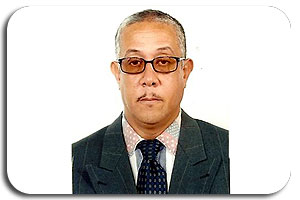 José FerreiraPresidentErvanária Ferreira
José FerreiraPresidentErvanária Ferreira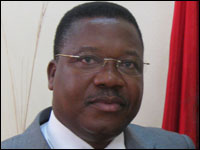 Mr. Jorge Inocencio DomboloGovernorThe Province of Bengo
Mr. Jorge Inocencio DomboloGovernorThe Province of Bengo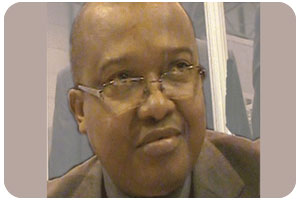 Arq. Amaro FranciscoGeneral DirectorTourism Foment Institute (INFOTUR)
Arq. Amaro FranciscoGeneral DirectorTourism Foment Institute (INFOTUR)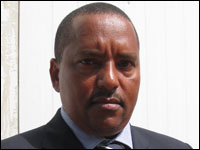 Eng. Lucio MartinsELISAL
Eng. Lucio MartinsELISAL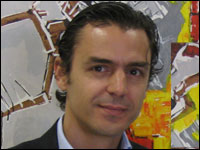 Dr. Ricardo SouzaDirecteur GénéralRobert Hudson
Dr. Ricardo SouzaDirecteur GénéralRobert Hudson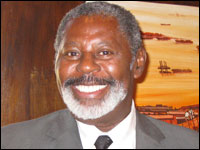 RUY ALBERTO VIEIRA DIAS RODRIGUES MINGASPRESIDENT DU CONSEIL DE DIRECTION DE L’UNIVERSITÉ LUSIADAUniversité Lusíada
RUY ALBERTO VIEIRA DIAS RODRIGUES MINGASPRESIDENT DU CONSEIL DE DIRECTION DE L’UNIVERSITÉ LUSIADAUniversité Lusíada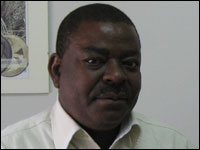 Mr. Marcos NhungaIDA
Mr. Marcos NhungaIDA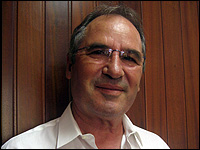 Mr. António MoçoAdministradorLyon
Mr. António MoçoAdministradorLyon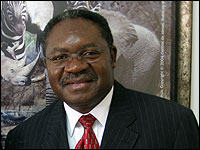 Mr. Tomas CaetanoManaging DirectorInstituto de Desenvolvimento Florestal
Mr. Tomas CaetanoManaging DirectorInstituto de Desenvolvimento Florestal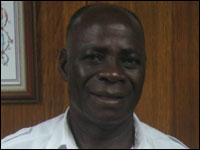 Mr. José Carlos GomesManaging DirectorPorto de Lobito
Mr. José Carlos GomesManaging DirectorPorto de Lobito Mr. Marcos VieiraVice-PresidentMetroeuropa
Mr. Marcos VieiraVice-PresidentMetroeuropa Mr. Marc SmuldersManaging DirectorNile Dutch Angola
Mr. Marc SmuldersManaging DirectorNile Dutch Angola Mr. Mefira AdamouManaging DirectorSociedade Mineira do Camatchia Camagico - Luó
Mr. Mefira AdamouManaging DirectorSociedade Mineira do Camatchia Camagico - Luó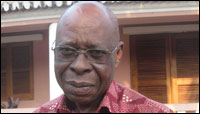 Mr. Marceal ItengoGovernorProvíncia de Lunda-Sul
Mr. Marceal ItengoGovernorProvíncia de Lunda-Sul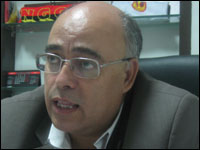 Mr. António CunhaCEOGrupo 7 Cunhas
Mr. António CunhaCEOGrupo 7 Cunhas Mr. António JustinoPresidentFederação Angolana de Voleibol
Mr. António JustinoPresidentFederação Angolana de Voleibol Clínica Anglodente UPRAMultisectorial
Clínica Anglodente UPRAMultisectorial Fitness ClubMultisectorial
Fitness ClubMultisectorial Clínica MuserraMultisectorial
Clínica MuserraMultisectorial Grupo 7 CunhasMultisectorial
Grupo 7 CunhasMultisectorial Organizações CosalMultisectorial
Organizações CosalMultisectorial Federação Angolana de FutebolSports
Federação Angolana de FutebolSports Federaçao Angolana de BasquetebolSports
Federaçao Angolana de BasquetebolSports Comité Olímpico AngolanoSports
Comité Olímpico AngolanoSports Federação Angolana de VoleibolSports
Federação Angolana de VoleibolSports Grupo Dry DockReal Estate
Grupo Dry DockReal Estate Ridge SolutionsReal Estate
Ridge SolutionsReal Estate AngonabeiroTrade & Industry
AngonabeiroTrade & Industry Nova CimangolaIndustry
Nova CimangolaIndustry Lyon Construções e Manutenções Metalomecânicas SAOil Services
Lyon Construções e Manutenções Metalomecânicas SAOil Services OCTOMAR Serviços MarítimosOil Services
OCTOMAR Serviços MarítimosOil Services PetrobrasOil Services
PetrobrasOil Services